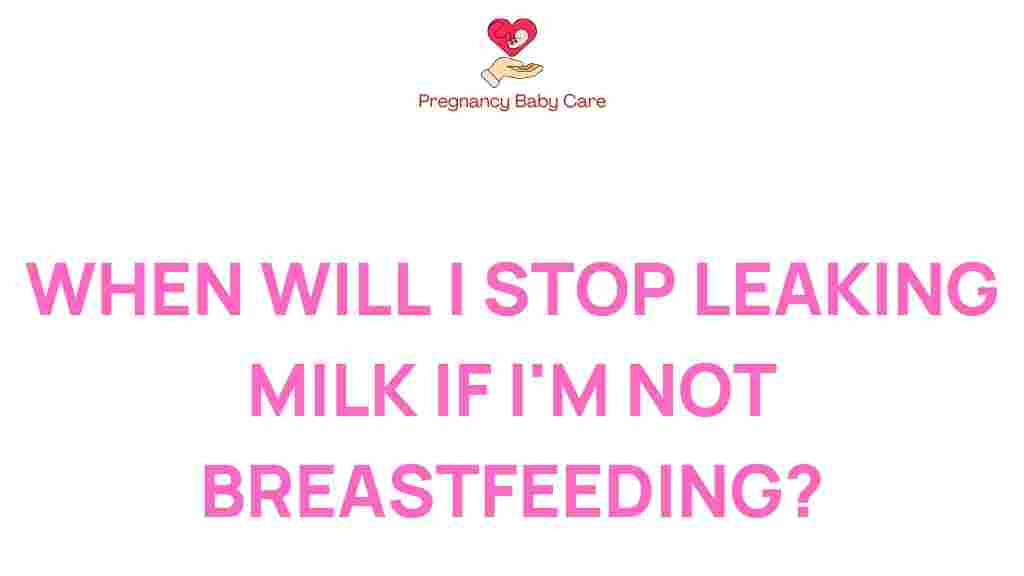The Mystery of Milk Leakage: When Will It Stop If You’re Not Breastfeeding?
For many new mothers, the experience of milk leakage is a common yet often perplexing occurrence during the postpartum period. This phenomenon can continue even after breastfeeding has ceased, leading to questions about the body’s natural processes, hormonal changes, and overall maternal health. In this article, we will explore the intricacies of milk production, the factors influencing milk leakage, and provide guidance on when you can expect it to stop if you are not breastfeeding.
Understanding Milk Production and Leakage
Milk leakage, also known as lactation or breast milk production, is primarily governed by hormonal changes in a woman’s body after childbirth. Here’s a closer look at how these factors play a role:
- Lactation Hormones: After giving birth, the body produces hormones such as prolactin and oxytocin, which stimulate milk production and release. Prolactin promotes milk synthesis, while oxytocin triggers the milk ejection reflex.
- Postpartum Changes: During the postpartum period, your body undergoes significant changes as it adjusts to not just your new baby but also your own hormonal shifts.
- Breastfeeding and Milk Supply: If you breastfeed, your body will continue to produce milk based on demand. However, if you are not breastfeeding or have ceased breastfeeding, your body will eventually adjust to that change.
The Timeline of Milk Leakage After Breastfeeding Cessation
Understanding how long milk leakage can persist after stopping breastfeeding is crucial for new mothers. The timeline can vary significantly among individuals, influenced by various factors such as hormonal changes and the duration of breastfeeding.
- Initial Cessation: After you stop breastfeeding, it’s common to experience milk leakage for several days to weeks. This is your body’s way of adjusting to the reduced demand for milk.
- Gradual Decrease: Over the next few weeks to months, you may notice a gradual decrease in milk leakage as prolactin levels drop and your body recognizes that milk is no longer needed.
- Complete Cessation: For some mothers, milk leakage may stop entirely within three to six months after weaning, while others may experience it for a longer duration.
Factors Influencing Duration of Milk Leakage
Several factors can affect how long milk leakage lasts post-breastfeeding:
- Duration of Breastfeeding: The longer you breastfeed, the longer it may take for your body to stop producing milk after cessation.
- Frequency of Nursing: If you breastfed frequently, your body may take longer to adjust to the absence of nursing sessions.
- Individual Hormonal Levels: Each woman’s hormonal balance is unique, which can affect how quickly milk production decreases.
- Weaning Method: Gradual weaning may lead to a smoother transition and shorter duration of leakage compared to abrupt cessation.
Step-by-Step Process: What to Expect When Cessation Happens
As you approach breastfeeding cessation, understanding what to expect can help ease concerns regarding milk leakage:
- Start Weaning Gradually: If possible, begin the weaning process slowly by reducing the number of breastfeeding sessions each day. This helps your body adjust gradually.
- Monitor Your Body: Pay attention to your body’s signals. You may notice changes in the frequency and amount of leakage as you reduce breastfeeding.
- Seek Support: If you experience discomfort or have concerns about milk leakage, consult with a lactation consultant or healthcare provider for personalized advice.
- Stay Hydrated and Nourished: Maintain a balanced diet and drink plenty of water to support overall maternal health during this transition.
- Give It Time: Understand that it may take weeks or months for milk leakage to stop completely. Patience is key as your body adjusts.
Troubleshooting Tips for Managing Milk Leakage
Experiencing milk leakage can be frustrating. Here are some troubleshooting tips to help manage this situation:
- Use Breast Pads: Invest in disposable or reusable breast pads to absorb any leakage and keep you comfortable.
- Wear Supportive Bras: A well-fitting, supportive bra can help reduce discomfort associated with leakage.
- Cold Compresses: If you experience engorgement, cold compresses can help alleviate discomfort and reduce milk production.
- Herbal Remedies: Some mothers find herbal supplements helpful in reducing milk production. Always consult with your healthcare provider before trying any new remedy.
- Consult a Professional: If leakage persists longer than expected, it’s advisable to consult a healthcare professional for evaluation and guidance.
The Role of Hormonal Changes in Milk Production
After weaning, hormonal changes continue to play a significant role in your body’s adjustment to the absence of breastfeeding:
- Prolactin Levels: As you stop breastfeeding, prolactin levels will gradually decrease, signaling your body to reduce milk production.
- Estrogen and Progesterone: These hormones also play a critical role in regulating the menstrual cycle and overall reproductive health, which can impact milk production.
- Emotional Well-being: Hormonal fluctuations can also affect your emotional health during the postpartum period, making it essential to prioritize self-care.
Conclusion: Embracing the Transition
The journey of motherhood is filled with changes, and understanding the mystery of milk leakage is a part of that experience. While the timeline for cessation can differ from one individual to another, it’s important to remember that your body is going through a natural adjustment process. With patience and awareness, you can navigate this transition smoothly.
If you have further questions about your experience, don’t hesitate to reach out to a healthcare provider or a lactation consultant. For more resources on maternal health, you can visit this helpful site.
In summary, milk leakage after breastfeeding is a common concern for many mothers. By understanding the factors that influence milk production and the hormonal changes that occur postpartum, you can better manage the transition and embrace this new phase of motherhood. Remember, you are not alone in this journey.
For more insights on breastfeeding and maternal health, you can check out our detailed guide on breastfeeding cessation.
This article is in the category Health and created by PregnancyBabyCare Team
